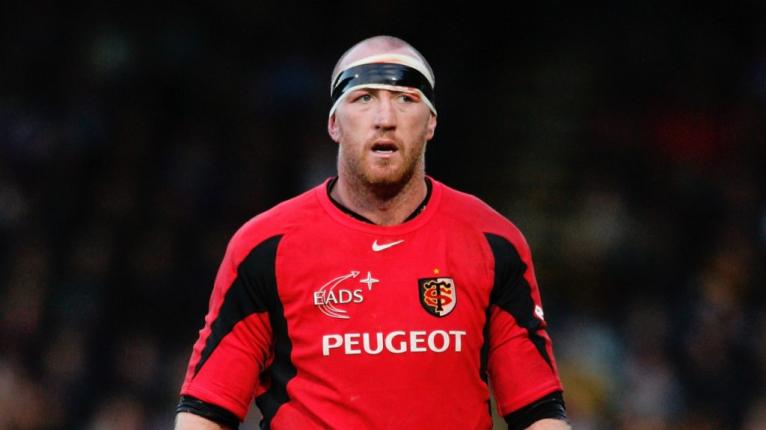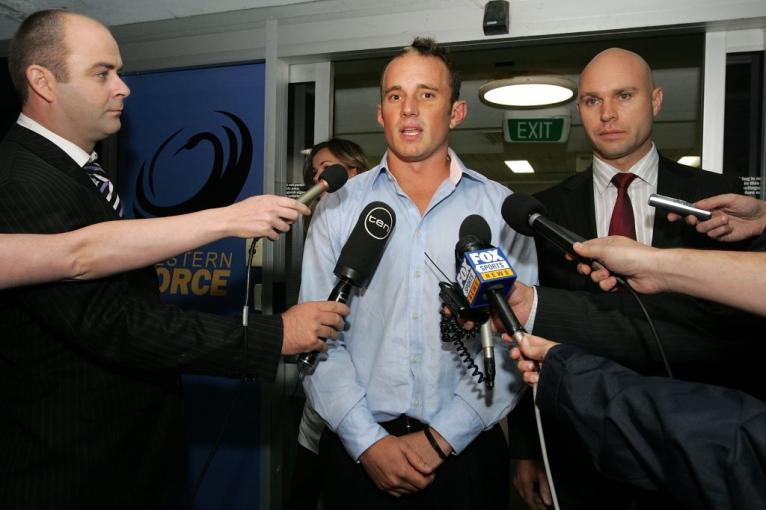Some rugby players retire and move effortlessly on to the next phase of their lives, and others don’t. Stuart Hogg is one of the latter. During his magnificent career, the Lions, Scotland and Exeter Chiefs full-back graced many a back page because of his exploits; since his retirement 12 months ago he’s been a regular on the front pages for all the wrong reasons.
His misdemeanours don’t need retelling suffice to say ‘Hoggy’ will stand trial next month in Scotland accused of domestic abuse.
Hogg will stand in the dock, not as a former rugby player but a current one, having come out of retirement in the summer to sign for Montpellier. Initial reports claimed that the 32-year-old had agreed a two-year deal with the Mediterranean club, with the option of a third, but Montpellier have since said he has joined as a ‘medical joker’, in other words on a short-term deal to cover for Anthony Bouthier, the France full-back, who is out until next year with ruptured knee ligaments.
Hogg himself is sidelined until late September at the earliest after tearing his calf in one of his first training sessions with Montpellier. Not the most auspicious start to his shot at redemption.

For that’s what it’s worth, Montpellier owner Mohed Altrad has thrown Hogg a lifeline – as he has to former France prop Mohamed Haouas, who was convicted of assaulting his wife in 2023, a sentence that prompted the FFR to announce his international career was over.
If Altrad – who along with Montpellier’s director of rugby, Bernard Laporte, was handed a suspended prison sentence in 2022 after being convicted by a Paris court of corruption – is prepared to overlook Haouas’s conviction, then presumably Hogg will also be shown clemency if he is found guilty next month.
It’s how Hogg performs on the pitch that matters to Altrad. Last season was a disaster for Montpellier. The club that won the Top 14 title in 2022 avoided relegation to the Pro D2 by the skin of their teeth, and Altrad responded by sacking head coach Patrice Collazo, the fifth such dismissal in five seasons.
Hogg is not joining a stable club but one that reflects his own volatility of late. It will be a challenge for the Scot, and he has little time to prove his worth to Altrad, particularly as the calf injury will rule him out of the first two or three matches.
He basically told me unless I showed a track record of not getting sent off or sin-binned, I could not be considered.
Altrad will also be watching how Hogg conducts himself off the pitch. Montpellier is a small sun-soaked city with the cafe culture characteristic of all resorts on the Mediterranean coast. It will be a novel experience for Hogg and an ideal opportunity to turn the page on 12 traumatic months.
It will require self-discipline on the part of Hogg but he can take inspiration from a handful of other Anglophone players who resurrected their careers – and reputations – in France.
Trevor Brennan was one such player. The Leinster and Ireland lock surprised the rugby world when he signed for Toulouse in 2002. The then 29-year-old had never been in trouble off the pitch but on it Brennan had a reputation for recklessness and he was contemplating quitting pro rugby when Toulouse made contact. In 2001 he had been axed by then Ireland coach Warren Gatland.
“He basically told me unless I showed a track record of not getting sent off or sin-binned, I could not be considered,” said Brennan, shortly before he signed for Toulouse.
When the two-year deal was announced, Brennan’s agent, John Baker, said ‘the potential benefits of this move go beyond rugby’. And so it proved. Brennan still lives in Toulouse, owning two successful pubs, and his son, Josh, was a member of the Toulouse team which last season won the European and Top 14 double.

Brennan senior won two European titles – in 2003 and 2005 – and the two-year contract he initially signed eventually ran to five seasons. Reflecting years later on the move, Brennan said that joining Toulouse ‘completely changed my life’.
The same was true of Jamie Cudmore when he signed for Clermont in 2005. The giant second row had spent time in a young offenders’ institution during his teenage years after falling foul of the law, and as Cudmore told me when I ghosted his autobiography in 2016 rugby was his redemption. The discipline of the sport smoothed off his rough edges while enabling him to indulge his relish for physical confrontation.
He spent eleven years at Clermont, becoming a cult figure among the Yellow Army, as the fans are known.
In leaving Australia, Henjak not only left his comfort zone, he also escaped his conflict zone. There were no journalists doorstepping him, or tough guys in pubs provoking him.
Another player with a volcanic temperament was Australian scrum-half Matt Henjak, who became an outcast in his homeland in 2008. That year he broke the jaw of a Western Force team-mate during a punch-up in a bar in Western Australia. His rap sheet already included being sent home from a Wallabies tour of South Africa in 2005 after Henjak had hurled ice at a group of students in a Cape Town nightclub. There was also an alleged assault charge in 2007, which was dropped when a large sum of money was paid to the victim.
Henjak was sacked by Western Force in February 2008 and, as one newspaper headline put it, his ‘career appears to be over’.
But Toulon offered Henjak a one-year deal with the option of a second season if he kept out of trouble. Not long into his stint in the south of France, Henjak – 26 at the time – told a visiting Australian journalist: “The club’s been really great. They find you a place to live and give you a car straight away when you get here. When the season starts they will put me into French school as well.”
Henjak didn’t squander his second chance. He took up the option of a second year with Toulon, and later signed on for two further seasons as the club began its rise to the top of European rugby. From being a pariah in Australia, Henjak became part of a squad that included Jonny Wilkinson, Sonny Bill Williams and Joe van Niekerk.

In leaving Australia, Henjak not only left his comfort zone, he also escaped his conflict zone. There were no journalists doorstepping him, or tough guys in pubs provoking him. He had left those distractions and temptations back home and his new environment obliged him to mature as he adapted to its new culture and a new language.
The same for Cudmore, who was honest and intelligent enough to recognise he had fallen in with a bad crowd and another spell in prison awaited if he didn’t sever ties.
There was also a determination to prove their detractors and their doubters wrong. Few in Ireland thought Trevor Brennan would be a success at Toulouse, but it was in the south of France – playing alongside some of the best talent in Europe – that he fulfilled his potential.
France gave Brennan, Cudmore and Henjak the chance to reinvent themselves and to be the players, and the men they really were.
That is the opportunity Montpellier have given Stuart Hogg. Some may say he doesn’t deserve it, but surely everyone merits a second chance.

